Walleye Delirium, moose poop, and Foreman Grills

By Maurice Switzer
Fishing on Lake Nipissing is not a body-contact sport…yet!
Sometimes the feuding over who-gets-to-catch-how-much-of-what can reach alarming proportions. But, we haven’t seen billy-clubs stuffed into creels, or gun barrels sticking out of rod cases, and there are no ministry gunboats patrolling the Manitou channels.
So far it’s been a war of words.
But if there’s one thing that gets the goat of some Canadians more than standing behind someone presenting their Status Card to a Walmart cashier it’s the notion that First Nations citizens have special rights to catch fish. What they absolutely refuse to understand is that Indigenous peoples paid for those rights.
The most recent Lake Nipissing dust-up erupted when a character who rents ice huts for a living announced on social media that he would not do business with Native fishers. The poor chap exhibited all the symptoms of Walleye Delirium, a fever that results when a parasite burrows its way into the cerebral cortex of people running low on Omega-3 fatty acids.
The condition results in the afflicted individuals making uncontrollable utterances – often in public places – in a manner similar to the unpredictable stream of obscenities that erupt from the mouths of sufferers of Tourette’s Syndrome.
I’ve personally witnessed several such outbursts, including one by an otherwise apparently normal gentleman who makes his nest in North Bay.
“Why are there two laws – one for the Natives and one for the rest of us?” was the gist of his misguided response to the ice-hut brouhaha in a timeworn refrain bristling with outrage, if burdened by ignorance.
TREATIES 101
Had he been trained as a lawyer, the delirious fellow might have understood that everyone in Canada actually DOES live under one law. It’s commonly called our Constitution, and Section 35 (1) is very clear and concise: “The aboriginal and treaty rights of Aboriginal peoples are hereby recognized and affirmed.” The Constitution also identifies Aboriginal peoples are those who possess First Nation, Metis, or Inuit heritage.
A treaty is dictionarily-defined as a legally-binding agreement entered into by “nations” containing terms that are mutually agreed-upon. The Royal Proclamation of 1763 – considered as a foundational document of Canadian jurisprudence – said that the “Indian tribes of North America” were to be regarded as “nations”.
First Nations agreed to accept the terms of subsequent treaties proposed by provincial and national governments in Canada that would permit European refugees to set up house on some of the lands which the Indigenous peoples had occupied exclusively for thousands of years – even before the invention of the fishing pole, let alone the Garmin Striker fish finder.
In return, the “Indians”, as King George III insisted on calling them– (remember, they said he was mad) – were promised that they would never be poor, and that they would be “unmolested” in their own lands. Unfortunately, that would not apply to the unfortunate ones who found themselves in residential schools.
Those lucky enough to be alive back home on their reserves were guaranteed that they could continue to hunt, fish, trap, and harvest as per usual, and “as long as the sun shines, the rivers run, and the grass grows,” This has been interpreted by the brightest legal minds in the land as still being applicable on overcast days, during severe droughts, and for Indians who have replaced their lawns with interlocking bricks.
This is the law of the land. One law, not two unless we’re dealing with people who suffer from Diplopia (double vision).
So far, so good.
MOOSE POOP
Being as how they depended on the lands and waters for thousands of years, the Indians were the first Greenpeace, the original environmentalists. They only harvested as many animals, fish, and plants as they needed to eat and to trade. There was no waste, no leftovers. A moose or deer was like a department store on legs – a regular walking Dollarama. The hide provided material for clothing and shoes, the meat would feed a village, antlers became spoons or needles, intestines made good string. If you dried a pile of moose poop it would make a great fire – perhaps you didn’t want to sit too close!
SHADES OF THE BEATLES
But then the refugees came. And once they got their cabins built, it wasn’t long before they started looking for ways to create some disposable income, as was the custom back in Liverpool, long before the Beatles wrote “Now give me money, that’s what I want!”
THE BIRTH OF CAPITALISM
And when the settlers saw that the Canadian woods were literally crawling with future fur coats, visions of Pounds Sterling danced in their heads. And when the Indians discovered that they could swap a few ratty old beaver skins for a George Foreman Grill, they got into the act and, voila – Capitalism was born.
FAST FORWARD
The Chief of Duchesnay and Points West presides over a community that does not have as many homes as there are non-Native ice huts on Lake Nipissing.
His job description is a) to convince his citizens that one at a time is good fishing, even when they say two-at-a-time is more fun; b) to quash rumours that his citizens are dragging nets behind submarines to scoop up all the slot-sized pickerel; c) to persuade people with Walleye Delirium that treaties are as good for Indians as Buckley’s cough syrup is for colds.
The Indians have trusted the settlers for 300 years.
Now it’s the settlers’ turn to trust the Indians.
(Maurice Switzer is a citizen of the Mississaugas of Alderville First Nation. He operates Nimkii Communications, a public education practice with a focus on the treaty relationship.)


